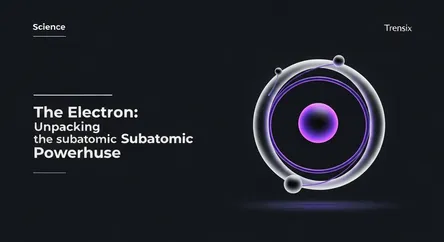Science
The Electron: Unpacking the Subatomic Powerhouse

Discover the electron, the fundamental particle that powers our technology, forms all matter, and drives the universe's chemical reactions.
What is it?
An electron is a fundamental subatomic particle carrying a negative electric charge. Unlike protons and neutrons which are in an atom's nucleus, electrons exist in a cloud orbiting it. Considered an elementary particle, it isn't made of any smaller components. With a mass approximately 1/1,836th that of a proton, its weight is negligible in calculating an atom's mass number. Governed by quantum mechanics, electrons exhibit both particle and wave-like properties. The arrangement and behavior of these tiny particles determine an element's chemical properties and how it interacts with other elements.
Why is it trending?
Electrons are constantly trending in science and technology due to their central role in innovation. Current research in condensed matter physics is exploring electron behavior in extreme conditions to discover new states of matter. These studies are critical for developing next-generation technologies, including more energy-efficient electronics, advanced sensors, and quantum computers. As scientists push the boundaries of materials science and computing, manipulating the quantum states of individual electrons remains a key frontier, promising revolutionary advancements in processing power and energy.
How does it affect people?
Electrons fundamentally affect every aspect of daily life. The flow of electrons through a conductor is electricity, the power source for our homes, industries, and devices. The exchange and sharing of electrons between atoms form chemical bonds, the basis of all matter, chemistry, and biological processes, including essential functions within the human body. Modern technology, from smartphones and computers to medical imaging like X-rays and life-saving radiation therapy, is entirely dependent on our ability to control and manipulate the behavior of electrons.